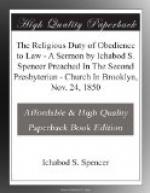But this latter class of duties, that is, our social duties, are not left to the individual judgment or independent choice of men, in such a sense, that they may obey or disobey human government just as they please. Not in the least. Human government is by the divine will. Obedience to it is obligatory upon men, by the will and law of God. St. Paul directing Titus how to preach, (and therefore directing all ministers of the gospel who come after him,) says to him, “Put them in mind to be subject to principalities and powers, to obey magistrates:” and I am doing it in this sermon. Human government is of divine authority, not the kind, but the fact. And consequently, our action about human government, our obedience to it, and our disobedience, are as much matters of religion, and coming under its authority and obligation, as are any other matters. If religion had nothing to do with them, I would have nothing to do with them here. But it has something to do with them. Human government is a divine ordinance. It is of divine authority. It is not a thing of mere human authority. Our religion, therefore, our holiness and final salvation are concerned in our sentiments, principles, and conduct in reference to human government. If God has left to men the choice of the kind of government they will have, he has not left it to their choice whether they will obey human government or not. He has commanded that obedience. Human government and law are by the will of God. This is a religious principle. And almost the entire sum of our second class of duties, by the will of God, lies under the regulation of human government. God has himself legislated in respect to the other class of duties. Human government is founded on the revealed will of God.
The different expressions contained in the texts which we have just read in your hearing, place this principle beyond all controversy. Glance at them again. “Put them in mind to be subject to principalities and powers, to obey magistrates.” (I am doing so—I am preaching gospel this morning.) “Let every soul be subject unto the higher powers. For there is no power but of God. The powers




